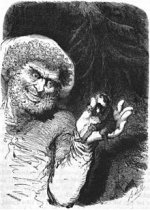I thought it was an interesting and thoughtful analysis. And completely disagreed with it. To me, Gaunter is the Trickster, Supernatural's Crossroad Demon, Lucifer, The Monkey's Paw and every Djinn story that's ever been written about the concept of "Be careful what you wish for, or it may come true". A supernatural being that exists, in some form or other, in many cultures and myths. And I also wonder if it's a coincidence that his initials spell "GOD", as a lot of the old gods also like messing with people.
And as to why he's doing it? Probably for entertainment. It must get boring being an immortal.
And as to why he's doing it? Probably for entertainment. It must get boring being an immortal.





